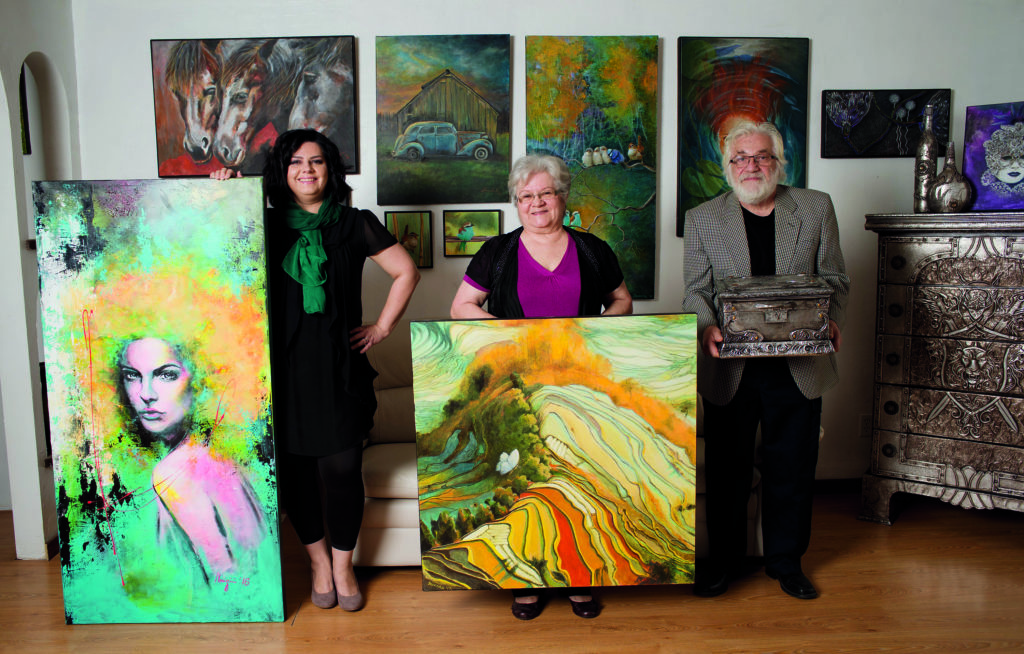
By Valerie Hill
Photos by Peter Lee
Entering the Kitchener home of Croatian refugees Angelo and Yasenka Vigini, visitors are struck by the obvious: this is the home of highly imaginative artists.
To start with, it looks like an art gallery with large canvas paintings in the family room, bedrooms and living room, hanging on walls and set on easels. This is the work of the Vigini family that also includes their daughter Martina Vigini-Raghunath. A second daughter, Mirella Vigini, is newly emerging and not quite ready for public recognition of her art.
“We come together as a family – there is no competition,” says Martina. “We inspire each other, we all have different styles.”
The Vigini family’s works are striking, filled with colour and powerful images, but what is even more surprising is the metal-embossed furniture and various metallic artifacts created by Angelo.
A truck driver with time on his hands while waiting for loads, Angelo came up with the idea about three years ago.
“When I’m driving, I have time to be thinking,” he says. “I had this flash of an idea, this is what I want to do, but how can I do this?”
That mental exercise led to his freehand embossed designs and he has since covered pretty much every surface in the house, including the kitchen cupboards, backsplash, stove venting hood, most electrical switch plates and all the mirrors. There are also several china cabinets, a grandfather clock, coffee tables and dressers, all embellished by his crafty hands and wild imagination.
No surface is safe from Angelo’s artistic vision.
When Yasenka was about to toss out a cooking pot with broken handles, Angelo instead covered it in his secret formula for turning boring old metal into art pieces, complete with glued-on jewels. He’s done the same with empty wine bottles, trunks and vases.
Though the 71-year-old is not eager to share his methods, he does show one of his basic supplies: a roll of shiny aluminum tape. The highly malleable foil is usually applied to furnace ductwork. He also uses aluminum Dollar Store oven trays. The trays might be disposable but not in the Vigini household.
“My dad never throws anything out,” said Martina.
Angelo uses special tools he made to mould and emboss the metal into detailed designs. The resulting work is part medieval and part steam punk.
For the Viginis, creativity runs in the family.
Angelo’s father was an established photographer and photo shop owner in Zagreb, Croatia, a business he took over after his parents died.
“I loved photography,” says Angelo. “I did classic portraiture and studio (film) development.”
His daughter adds, “He was also interested in painting and was painting when he was 11.”
Indeed, Angelo recalls a day when he was about 14 and waited until his parents left the apartment for the evening so he’d have the place to himself. Instead of getting into mischief, he wanted some private time to paint the city view from the apartment balcony.
“I said to them ‘Go, go, I like to be alone,’ ” he recalls. They returned to a completed painting, one he still owns.
“I didn’t go to school for painting; I planned to be a professional photographer,” he says.
However, despite his love of the art form, Angelo couldn’t see a future.
“I felt photography was done,” he says. His next venture was running a fashion boutique for children. “The business did very well, then the Balkan War. The business was in trouble and I decided to change our lives.”
The family fled Croatia in 1993 during the conflict, arriving in Toronto, where Angelo found a job as a truck driver.
In 2002, the family moved to the more affordable Kitchener, to a house that was soon filled with their art and Angelo’s gift for building. Angelo had considered opening another boutique but felt there was too much competition. Trucking seemed a good option. He would have a regular paycheque and enough downtime to think about art.
Martina and Yasenka didn’t pursue art when they first arrived in Canada. First, they all needed to learn English and settle into a country where the culture was so different.
When Yasenka and Martina were finally ready to emerge into the Waterloo Region art scene, their first step was to apply to the November 2013 juried show, Box 13, an arts collective that ran shows in industrial locations such as old factories.
“She got in, I didn’t,” says Martina, who trained as a graphic designer in Canada and now runs Refine Design, an interior design and home staging company. Her company represents her parents as well.
Yasenka, who is also a masterful gardener, had loved art as a child and studied at the School of Fine Arts in Zagreb, the same institute Martina and Mirella attended. Angelo graduated with a bachelor of photography degree from a different school and taught himself to paint, inspired by outdoor scenes, old machinery and horses. He loves horses.
Yasenka, who has won several Central Ontario Art Association awards, says she is influenced by nature, and several of her paintings depict wildlife as well as landscapes. She is also inspired to paint redheads, a colour pallete that appeals to her because of its sensuality, passion and boldness. She has also received high praise for her depiction of rice field landscapes, with their multi-hued terraces.
As a family, they are hoping to eventually have joint exhibitions. In the meantime, Martina wants to promote her dad’s furniture, knowing each piece is unique.
“My name is Angelo: maybe one day I’ll be Michelangelo,” he adds, with his typical good humour and big ideas.
